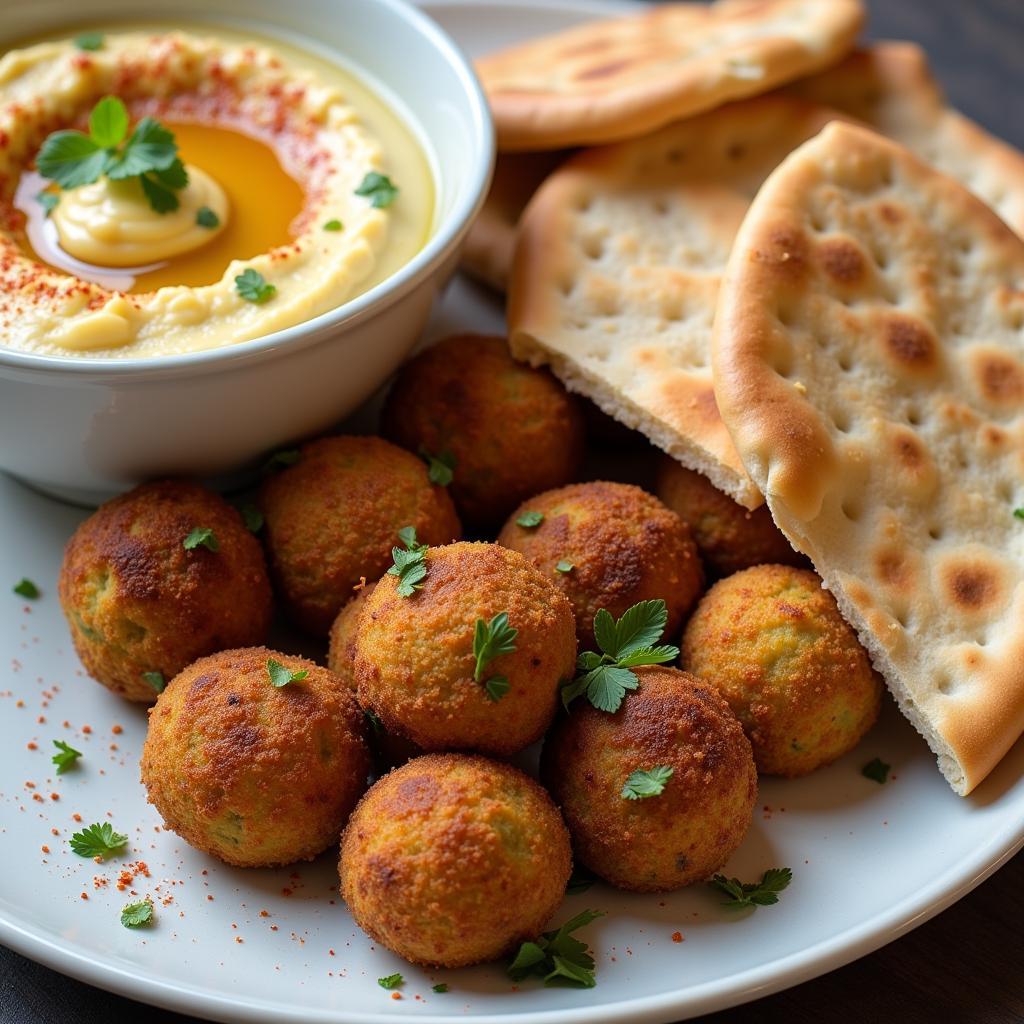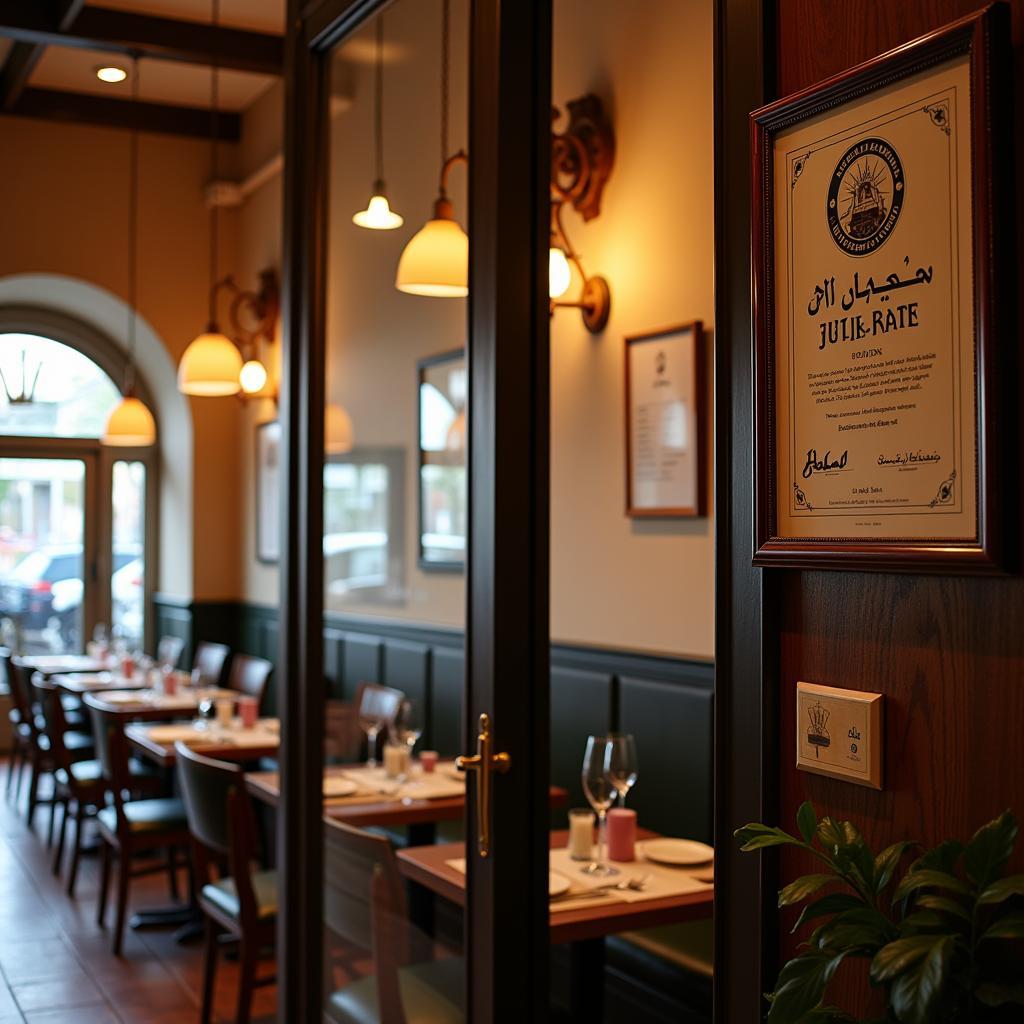The question “Is Mediterranean Food Halal?” is a common one, especially for Muslim diners exploring this vibrant and flavorful cuisine. While Mediterranean food often incorporates halal ingredients, it’s not always automatically halal. Let’s delve into what makes a dish halal and how to navigate the Mediterranean food scene while adhering to Islamic dietary laws.
Understanding Halal Dietary Guidelines
Halal, meaning “permissible” in Arabic, refers to food and practices allowed under Islamic law. In terms of food, this means avoiding certain ingredients and ensuring the slaughter of permitted animals adheres to specific guidelines. Pork, alcohol, and carnivorous animals are strictly prohibited. Permitted animals, such as lamb, beef, and chicken, must be slaughtered in a specific manner, invoking the name of God.
Key Halal Considerations in Mediterranean Cuisine
Many Mediterranean staples, like olive oil, vegetables, fruits, and grains, are inherently halal. However, certain ingredients and preparation methods require closer scrutiny:
- Meat: Verify the sourcing and slaughter method of meat dishes. Look for halal certification or inquire with the restaurant.
- Alcohol: Wine is commonly used in Mediterranean cooking. Be sure to specify “no alcohol” when ordering, and be aware that some dishes might contain traces of alcohol even if not explicitly listed.
- Cross-Contamination: In restaurants serving both halal and non-halal items, cross-contamination can be a concern. It’s always best to inquire about the restaurant’s halal practices.
Navigating the Mediterranean Menu: Halal Choices
While not all Mediterranean food is halal, there are plenty of delicious halal options to enjoy. Here are some popular choices:
- Hummus: This chickpea-based dip is a classic Mediterranean staple and typically halal.
- Falafel: These deep-fried chickpea patties are another excellent vegetarian and halal option.
 Close-up of halal Mediterranean dishes like falafel and hummus.
Close-up of halal Mediterranean dishes like falafel and hummus. - Grilled Kebabs: Seek out kebabs made with halal-certified lamb, beef, or chicken.
- Salads: Mediterranean salads bursting with fresh vegetables and herbs are generally halal-friendly.
- Vegetarian Dishes: Many Mediterranean cuisines boast a wide array of vegetarian dishes inherently halal. Explore options like stuffed grape leaves (dolmas) with rice and herbs, or lentil soup. is halal mediterranean food
“Ensuring halal authenticity is paramount in maintaining the integrity of our culinary traditions,” says Chef Omar Hassan, a renowned expert in Middle Eastern cuisine. “It’s not just about the ingredients; it’s about the entire process, from sourcing to preparation.”
Is all Mediterranean food halal?
No, not all Mediterranean food is inherently halal. While many dishes use halal ingredients, factors like meat sourcing, alcohol use, and cross-contamination can affect a dish’s halal status. Always verify with the restaurant or check for halal certification.
What are some common halal Mediterranean dishes?
Many popular Mediterranean dishes are naturally halal, such as hummus, falafel, salads, and various vegetarian options. Grilled kebabs can also be halal if the meat is sourced and prepared according to Islamic guidelines. vegetarian middle eastern food recipes
“Dining out shouldn’t be a source of anxiety for observant Muslims,” says Amina Khan, a registered dietitian specializing in halal nutrition. “With a little research and communication, it’s perfectly possible to enjoy the diverse flavors of Mediterranean cuisine while adhering to halal principles.”  A Mediterranean restaurant displaying its halal certification.
A Mediterranean restaurant displaying its halal certification.
Finding Halal Mediterranean Food
When dining out, look for restaurants that explicitly state they serve halal food or have halal certification. Don’t hesitate to inquire about specific ingredients and preparation methods. halal food arlington va You can also find resources online and within your community to identify halal-friendly establishments. london food blog Consider exploring local islamic food pantry options for access to halal ingredients.
In conclusion, while the answer to “is mediterranean food halal?” isn’t a simple yes or no, with careful consideration and communication, you can savor the rich flavors of the Mediterranean while adhering to halal dietary guidelines. Enjoy exploring this vibrant culinary landscape!
FAQ
-
Is seafood halal in Mediterranean cuisine? Yes, generally, seafood is considered halal.
-
Are all cheeses halal? Most cheeses are halal, but some use animal rennet, which may not be halal. Check the ingredients.
-
What should I ask a restaurant to ensure my meal is halal? Inquire about meat sourcing, alcohol usage in dishes, and cross-contamination prevention measures.
-
Are there vegetarian options in Mediterranean cuisine? Yes, there are numerous delicious vegetarian and vegan Mediterranean dishes, many of which are inherently halal.
-
Can I find halal Mediterranean food near me? Online resources, community groups, and restaurant reviews can help you locate halal Mediterranean establishments.
-
Is it difficult to maintain a halal diet while enjoying Mediterranean food? Not at all! With a little research and communication, you can easily find and enjoy halal Mediterranean cuisine.
-
Are there any specific spices or herbs I should be aware of in Mediterranean cuisine? Most herbs and spices are halal, but always check ingredients for any non-halal additives.
When in need of assistance, feel free to contact us. Phone: 02437655121, Email: [email protected] Or visit us at: 3PGH+8R9, ĐT70A, thôn Trung, Bắc Từ Liêm, Hà Nội, Việt Nam. Our customer support team is available 24/7.